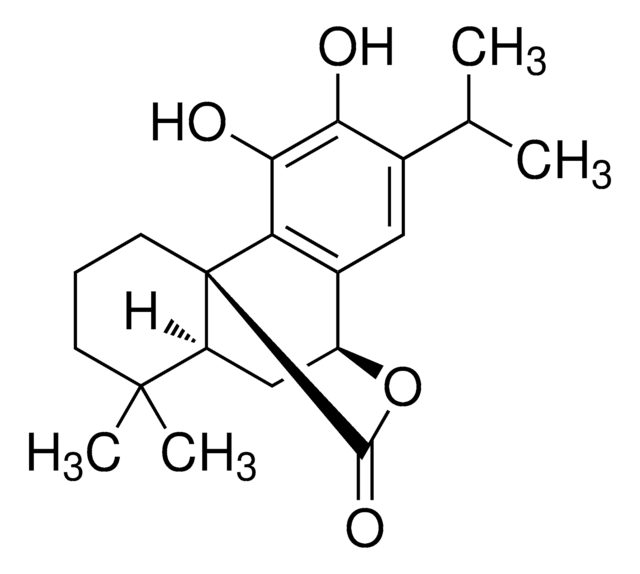추천 제품
생물학적 소스
Rosemarinus officinalis L.
형태
powder
응용 분야
metabolomics
vitamins, nutraceuticals, and natural products
배송 상태
dry ice
저장 온도
−20°C
SMILES string
CC(C)c1cc2[C@@H]3C[C@H]4C(C)(C)CCC[C@]4(C(=O)O3)c2c(O)c1O
InChI
1S/C20H26O4/c1-10(2)11-8-12-13-9-14-19(3,4)6-5-7-20(14,18(23)24-13)15(12)17(22)16(11)21/h8,10,13-14,21-22H,5-7,9H2,1-4H3/t13-,14-,20+/m0/s1
InChI key
XUSYGBPHQBWGAD-PJSUUKDQSA-N
유사한 제품을 찾으십니까? 방문 제품 비교 안내
일반 설명
Carnosol (CAR) is an ortho-diphenolic diterpene, extracted from the Mediterranean dietary herb Rosmarinus officinalis L. (rosemary). It was first isolated from the Salvia carnosa (Sage) plant. Carnosol is also a pro-electrophilic molecule.
애플리케이션
Carnosol has been used as an anti-cancer agent:
- to test its anti-cancer and anti-proliferative activities on cancer stem-like cells (CSCs) and Glioblastoma multiforme (GBM) cells
- to inspect its anti-carcinogenic effects on nineteen genes involved in up-and down-regulation of different genetic carcinogenesis pathways and on HeLa cells in human cervical cancer model
- as a reference standard to identify and quantify the metabolites of rosemary extract using liquid chromatography coupled to tandem mass spectrometry (LC/ESI-MS/MS)
생화학적/생리학적 작용
Carnosol together with carnosic acid (CA) accounts for 90% of the antioxidant activity of rosemary leaves. It exerts neuroprotective properties and protects against neuroinflammation, and oxidative stress-induced brain damage under chronic stress conditions. Carnosol is a strong chemo-therapeutic agent studied for several types of cancer like breast, leukemia, skin, prostate, and colon. It is also an antimicrobial agent.
A phenolic diterpene with antioxidant and anticarcinogenic activities.
신호어
Warning
유해 및 위험 성명서
예방조치 성명서
Hazard Classifications
Skin Sens. 1
Storage Class Code
11 - Combustible Solids
WGK
WGK 3
Flash Point (°F)
Not applicable
Flash Point (°C)
Not applicable
시험 성적서(COA)
제품의 로트/배치 번호를 입력하여 시험 성적서(COA)을 검색하십시오. 로트 및 배치 번호는 제품 라벨에 있는 ‘로트’ 또는 ‘배치’라는 용어 뒤에서 찾을 수 있습니다.
이미 열람한 고객
Marcos Roberto de Oliveira
Molecular neurobiology, 53(9), 6155-6168 (2016-11-01)
Carnosic acid (CA) and carnosol are the major diterpenes found in Rosmarinus officinalis (rosemary), a culinary spice. CA and carnosol account for over 90 % of its anti-oxidant activity in rosemary leaves. The diterpenes exert anti-oxidant, anti-inflammatory, and anti-carcinogenic activities, and
The anticancer molecular mechanism of Carnosol in human cervical cancer cells: An in vitro study
Hafidha RR and Abdulamirb AS
Asia-Pacific Journal of Molecular Biology and Biotechnology, 88-98 (2020)
Lucia Cattaneo et al.
PloS one, 10(7), e0132439-e0132439 (2015-07-16)
Rosemary (Rosmarinus officinalis L.) has been used since ancient times in traditional medicine, while nowadays various rosemary formulations are increasingly exploited by alternative medicine to cure or prevent a wide range of health disorders. Rosemary's bioproperties have prompted scientific investigation
Saeed Samarghandian et al.
BMC complementary and alternative medicine, 17(1), 249-249 (2017-05-06)
Oxidative stress through chronic stress destroys the brain function. There are many documents have shown that carnosol may have a therapeutic effect versus free radical induced diseases. The current research focused the protective effect of carnosol against the brain injury
Marvin J Núñez et al.
Phytochemistry, 72(4-5), 385-390 (2011-02-15)
Two ent-rosane- (cuzcol, 1 and 6-dehydroxycuzcol, 2) and a abietatriene- (salvadoriol, 3) type diterpenoids have been isolated from Maytenus cuzcoina and Crossopetalum uragoga, respectively, along with five known diterpene compounds (4-8). Their stereostructures have been elucidated on the basis of
자사의 과학자팀은 생명 과학, 재료 과학, 화학 합성, 크로마토그래피, 분석 및 기타 많은 영역을 포함한 모든 과학 분야에 경험이 있습니다..
고객지원팀으로 연락바랍니다.











